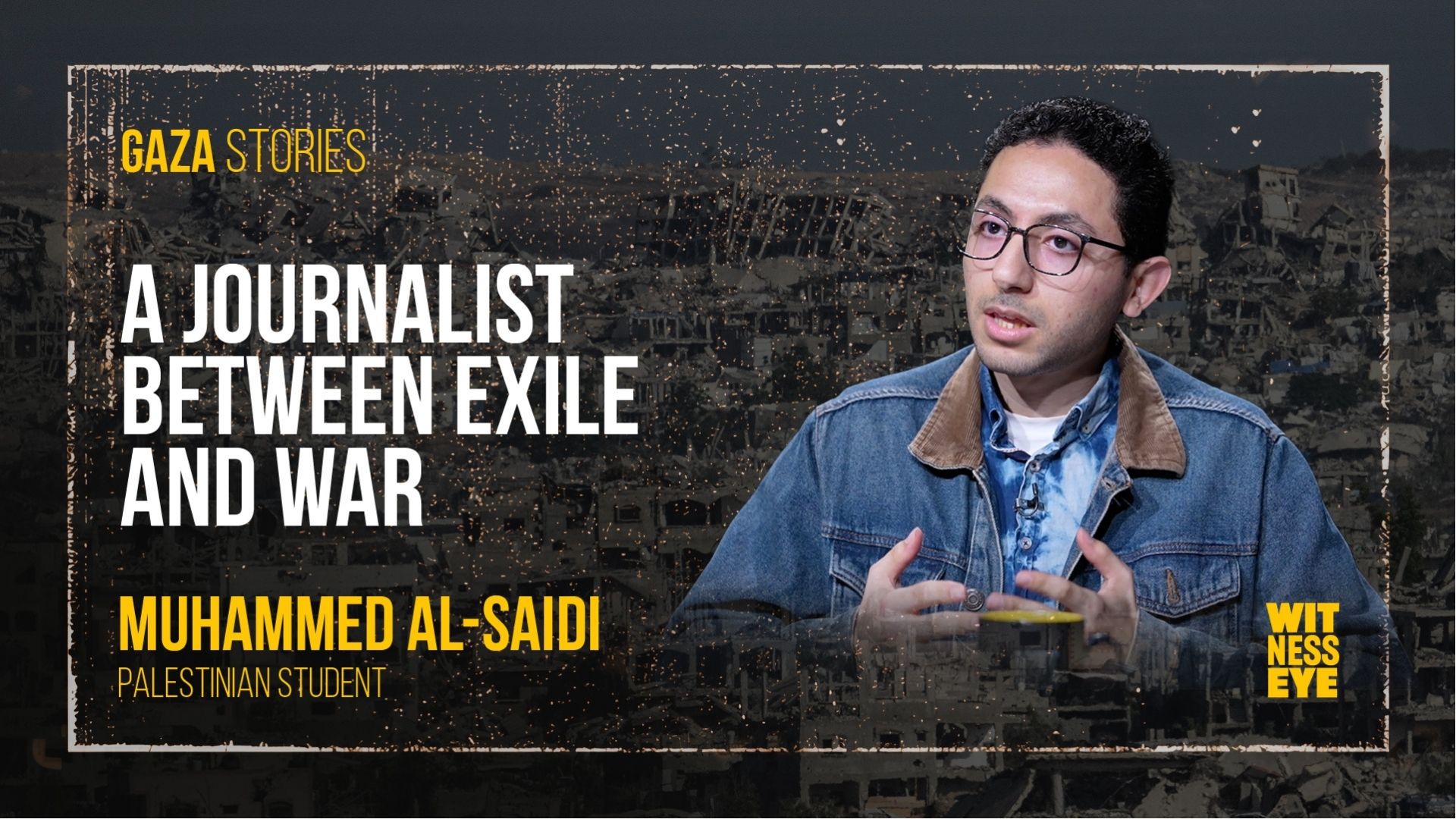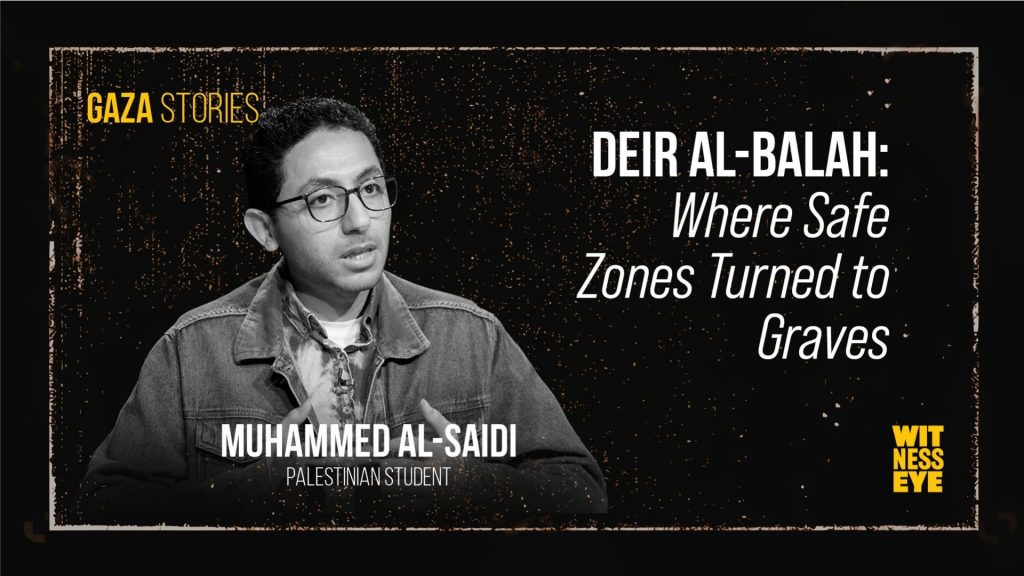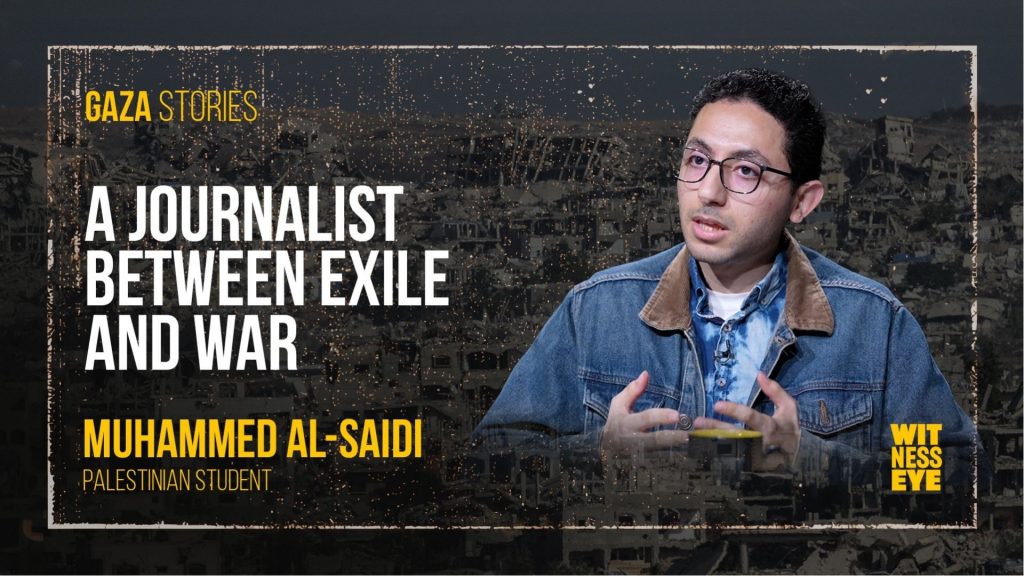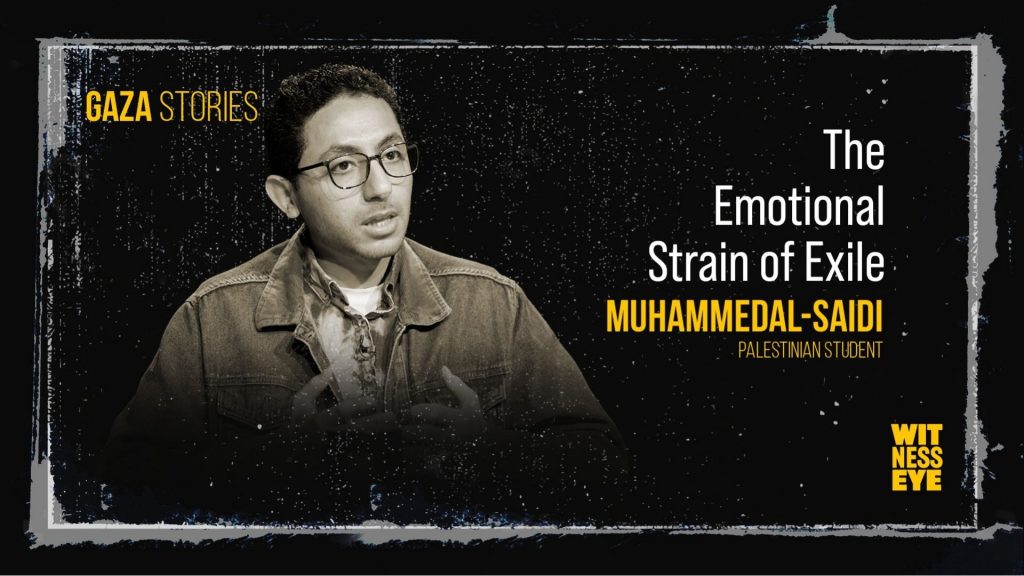
A Journalist Between Exile and War brings us the voice of Mohammed Al-Saidi, carrying both memory and struggle. From Deir al-Balah, where “safe zones” never truly meant safety, to the silence of exile, his story bridges two worlds. It speaks of bombed homes, untreated illnesses, and families torn apart. It also tells of young journalists paying the ultimate price to keep Gaza’s truth alive. Beyond numbers and headlines, every disappearance is a life, every silence a cry. From the Nakba until today, his words remind us that justice remains long overdue. This testimony is part of Gaza Stories, a collective effort to preserve truth and memory for justice.

Deir al-Balah: Where Safe Zones Turned to Graves
Mohammed Al-Saidi grew up in Deir al-Balah, a farming town that has never been far from war. His family lived there until the 2014 assault. As he recalled in the interview, lasted for nearly two months. “The sounds of bombing and destruction never stopped,” he said, describing how neighbors were injured and homes around them collapsed. Ramadan that year was unlike any other days of fasting were marked not by prayer and peace. But by fear, hunger, and sleepless nights. He remembered how the family would sit together at dusk. Too afraid to enjoy food, waiting instead for the next airstrike.
Even when the war ended, its weight remained in every memory, every scar left on the streets of his hometown. Relatives were killed, and even the nights of Ramadan passed under shelling. He recalls fasting while explosions lit the sky, unable to eat or sleep in peace. What should have been a holy time instead became days of hunger and constant fear. The so-called “safe zone” around Deir al-Balah was never truly safe. Civilian homes were struck, and people fleeing from the north were killed where they sought shelter. Among the dead was his own schoolmate, who had taken responsibility for his family after his father’s death. For Mohammed, these losses proved that safety was only an illusion.Exile added its own weight. The absence of home and community stayed close no matter where they went. Mohammed came to realize that distance could spare him from the bombs, but never from the wounds Gaza carved into his heart.

“Safe Zones” That Were Never Truly Safe
Deir al-Balah was labeled a “safe area” by the occupation forces. In reality, bombings followed families fleeing northern Gaza, striking homes filled with displaced relatives. Mohammed lost neighbors and relatives to these so-called safe zones. Even his schoolmate, the family’s breadwinner, was killed with loved ones in their house.
The Silent Casualties of Medical Neglect in Gaza
War in Gaza does not only kill through bombs. It also takes the lives of the sick who cannot find medicine or treatment. Mohammed recalls his aunt’s husband, who was ill long before the recent attacks. When medicines and hospitals could no longer provide care, his condition worsened. In the end, he died—not from a strike, but because Gaza’s health system had collapsed. His death left behind a grieving wife and seven children now without their father. For Mohammed, this loss shows another face of war: patients whose lives end quietly, without headlines, simply because medicine never reached them.
Exile’s Heavy Burden: Mohammed carries Gaza’s pain
From Turkey, Mohammed carries Gaza’s pain like a shadow he cannot escape. Every day begins with worry, wondering if his family has survived the night. Communication is rare, and sometimes weeks or even months pass without word. Each message that does arrive feels like a fragile lifeline across the blockade. Sending money is no relief, as nearly a third vanishes to unfair fees. What remains barely covers flour, rice, or fuel in a market drained by war. Families stand in long lines for aid but often leave with nothing. Mohammed knows his support cannot take away their hunger or fear.
Exile spares him the bombs, but it never spares him the burden. His heart remains in Gaza, where every loss weighs twice as heavy from afar.

The Emotional Strain of Exile
Palestinian families abroad face a crushing reality: survival is shared across borders. Exiles must work harder, sacrifice more, and bear guilt when help falls short. Mohammed describes it simply: living away does not protect him from Gaza’s grief. It only multiplies the suffering.
Journalism as a Resistance from Gaza
Despite living in exile, Mohammed refuses silence and turns journalism into his weapon. Through Telegram and Twitter, he publishes urgent updates on Gaza’s daily suffering. Each report carries not only facts but also the voices of silenced victims. His work depends on correspondents inside Gaza, who risk everything to send material. Internet points become gathering places, yet they are often bombed with chilling precision. Many journalists wear press vests, but even that does not shield them from targeting. Mohammed knows every video or photo could be the last from a colleague. Yet he continues, believing truth is the strongest form of resistance. Each post resists erasure, ensuring Gaza’s pain is recorded and remembered. For Mohammed, journalism is not just work—it is survival through storytelling.
Colleagues Who Paid the Ultimate Price
Mohammed lost friends and colleagues to targeted assassinations. Hassan Esliah, once a field reporter, was killed inside a hospital after earlier injuries. More than 215 journalists have been martyred in Gaza since the war began. Mohammed insists their sacrifice must not silence others, but strengthen the will to continue.
Beyond Statistics: Human Stories that Break Indifference
Mohammed warns that numbers alone cannot capture Gaza’s suffering. Figures blur into routine, losing emotional weight as wars drag on. Instead, Gaza Stories should focus on individuals—children separated, mothers grieving, families shattered. Behind every number lies a life, dreams, and memories erased by bombs.
The Weight of History and the Hope for Justice
When the Nakba anniversary arrived, Mohammed said he could not ignore the echoes of the past. The stories his grandparents once told—of families forced out with nothing but what they could carry—were no longer history but reality again. He stresses that every testimony, every record of destruction, and every personal story has value. In his words, these pieces together build a case for justice, even if the world chooses to recognize it only after many years. He looks at examples from other places—Bosnia, South Africa—and insists that persistence can turn memory into accountability. Justice may not come quickly, but silence would only erase the truth. For Mohammed, every act of writing, every testimony, is not only resistance but also a promise to future generations that their suffering will not be forgotten.
Through The Witnessing Eye and the Call for Justice
Mohammed’s words don’t just tell a story about Gaza—they call out the world we all live in. Here’s the real deal: injustice in one place always shakes justice everywhere. Gaza’s tragedy is not a faraway event; it’s a mirror that shows how humanity is failing. What really stands out is this: every silence, every delayed action, every ignored cry makes us complicit. That’s why Gaza Stories matter so much. This all leads to one clear thing: justice isn’t a privilege for the lucky few—it’s a right for everyone. Gaza’s demand for it is bigger than borders. Feels like that’s where it’s pointing—true justice can’t be broken into pieces; it has to belong to everyone, everywhere.
Mohammed Al-Saidi’s story weaves together the wounds of war, the silence of exile, and the struggle to keep Gaza’s truth alive. Through his journalism, he transforms memory into resistance, ensuring that behind every number, the human lives and losses are not forgotten. His voice reminds us that justice is long overdue—and that Gaza’s call for dignity and truth belongs to all of humanity. Hear the testimony of Mohammed Al-Saidi in his own words—a witness to war, exile, and resistance, carrying Gaza’s pain and the call for justice.
Stay Connected with Witness Eye
Follow us on our official channels:
